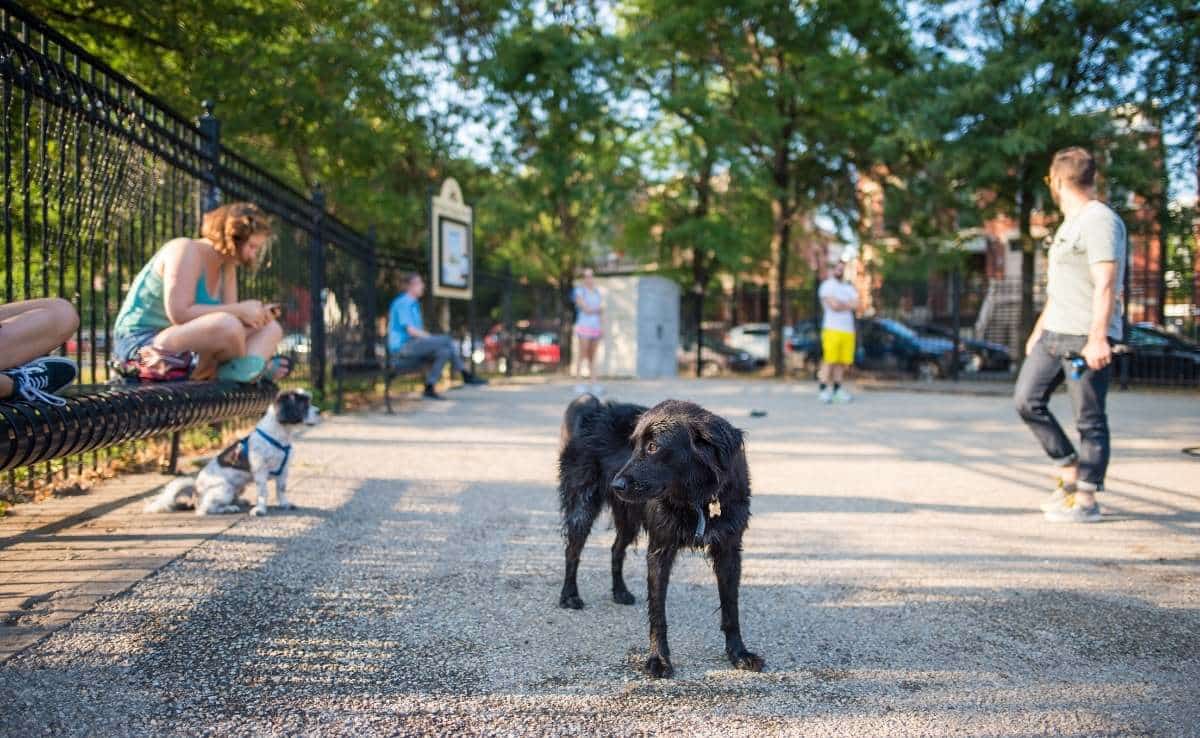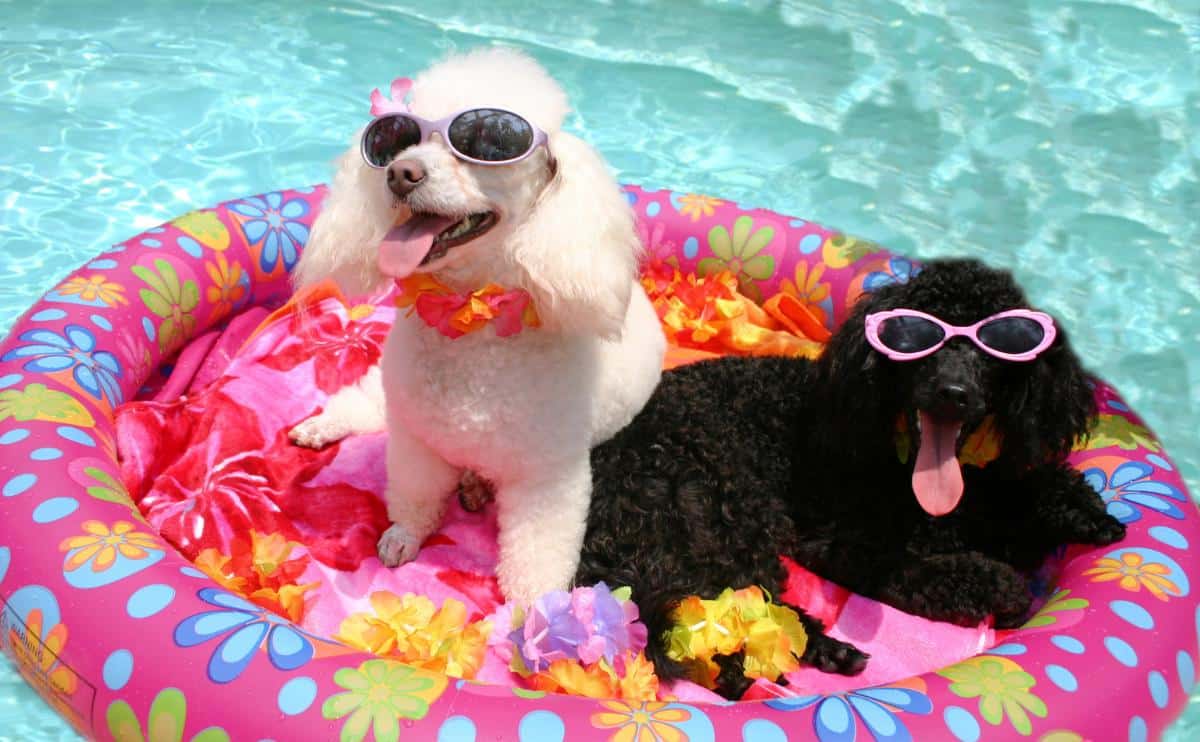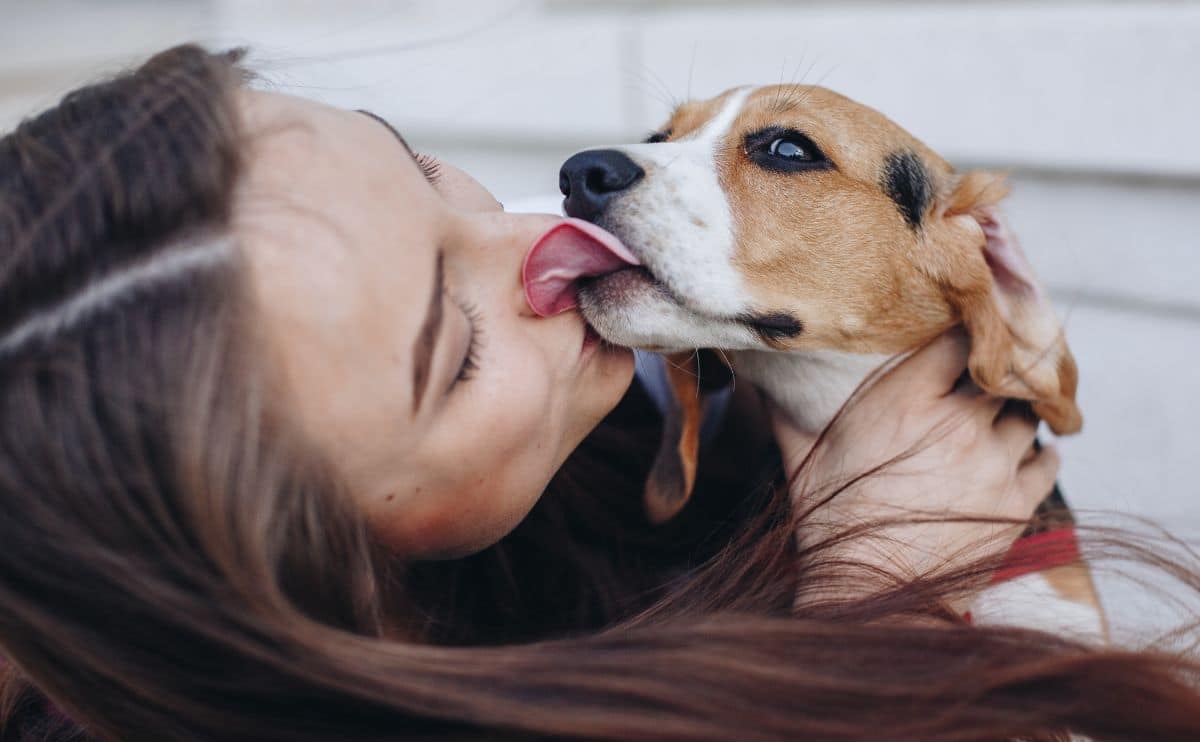Dog Park Etiquette For Pups & Parents To Play Well With Others
When you purchase through links on our site, we may earn a commission. Here’s how it works.
Are dog parks good for dogs? Yes! Dog parks are a great way to get out and socialize your furry companion (and yourself). With the growing number of dog parks in U.S. cities and suburbs and the ever-changing rules and regulations of carrying dogs outside of the house, there has never been a better time to get out and roam off-leash. However, there are guidelines to follow and rules to keep in mind to help you make the most of your time together.
Table of Contents

What Is A Dog Park?
A dog park is a designated place for owners to let dogs run with little restrictions and be with other dogs. They are among the last places where you can allow your dog to roam freely in today’s world. Because of this, they are an increasingly popular attraction. In fact, the number of dog parks is up 74% since 2009, according to The Trust for Public Land, making it the highest growth segment for urban parks in the U.S. today.
According to the same study, the top city for dog parks is Boise, Idaho, with 5.7 locations per 100,000 residents. Portland, Oregon, holds the number two spot, followed by Henderson, Nevada, Norfolk, Virginia, and San Francisco, California.
General Dog Park Etiquette

While the rules can differ from dog park to dog park, there are some universal guidelines that you’ll want to stick to if you own a dog and want to take them to the dog park. Many of these laws are already in place by local municipalities, meaning you can be fined if you don’t follow them. But most of them are just plain common sense. I break down some of the primary guidelines you’ll need to adhere to in order to maintain proper dog park etiquette.
*Please note that we are not attorneys nor legally responsible for you or your dog. If you have questions about your local dog park restrictions, please contact your state or local government. For legal questions, always consult with a licensed attorney.
No Dangerous Or Aggressive Dogs
If your dog has a history of being aggressive or is more aggressive by nature with people or other dogs, it’s best to avoid the dog park altogether so you can avoid any difficult situations. You will need to check legal requirements in your state, but there may be harsher penalties for you legally if you bring a dog that’s been known to bite into a dog park. The last thing you want is for your dog to bite another dog or human. Just in case, learn what to do if your dog bites someone in this guide.
No Female Dogs In Heat
Female dogs in heat can increase aggression in male dogs, especially intact male dogs that haven’t been neutered. For this reason, female dogs in heat shouldn’t go to the dog park, or it could create a dog-reactive situation for the female dog owner and any other dogs that may have heightened aggression as a result of that owner not complying with this rule.
Visual Contact
You’ll need to keep visual contact with your dog at all times. Most dog owners are fairly good at this, but occasionally, some owners will use the time to socialize and not pay attention. This can result in your dog being injured if approaching an aggressive dog or your dog injuring someone if they are in a situation they aren’t comfortable with. Never leave your dog unattended at the dog park.
Keeping a visual on your pup also means staying away from the phone. Dog park time is not the time to catch up on texts, socials, and emails. Your pup needs your undivided attention to ensure everything stays fun and safe for everyone.
Take Care Bringing Children
I recommend not bringing any kids into the dog park with you, especially if it’s a busy day. With that being said, people do, and it can be fine under normal circumstances. Make sure to check local laws for off-leash areas because it’s possible your local guidelines restrict children from entering the dog park grounds. If they allow it and you bring a child in, keep your eyes closely on your child, and do not let them pet strange dogs without their owner’s permission to do so.
Dog Bites
Dog parks can be places where dog-to-dog bites happen or dog-to-human bites occur. If this happens, most states will require you to report it to animal control or local law enforcement. Make sure you review your local laws to determine the legal course of action you need to take. If you are bitten, or your dog is bitten, report it right away in accordance with those guidelines.
You could likely be held legally responsible if your dog bites a child or an adult. You could also be responsible even if your dog just jumps on someone and happens to knock them down. If your pup hasn’t shown aggression in the past but does at the park, remove your dog immediately.
Be Cautious With Treats & Toys
Don’t bring dog treats with you to the dog park! Some dogs are food-aggressive. Even if your dog is not, it doesn’t mean that other dogs won’t smell the food or treats and start to food guard. Dog toys are similar. Some dogs can get possessive of their toys, so it’s best just to leave them at home, even if they are indestructible dog toys that can take some abuse.
Watch For Digging
If your pup decides to dig some holes, make sure you fill them back in. Not only will the holes create an eyesore, but they could also create a tripping hazard for other dogs or dog owners. Most dogs won’t dig quickly enough to dig an enormous hole, so take a few minutes and replace the dirt your pup dug up before you leave.
Always Close The Doors & Gates
Close the doors properly as you enter and exit the dog park. This will prevent off-leash dogs from exiting the park. Most states require a two-gate system, which will help ensure that your dog doesn’t run away.
5 Tips To Prepare For Your First Dog Park Visit

Dog park rules vary by state and city. There are no hard and fast rules in public dog parks (other than your local laws). But there are some proper guidelines you should follow and precautions you can take care of before you visit the park for the first time to make it successful for everyone.
1. Make Sure Vaccinations Are Up To Date
According to the American Veterinary Medical Association, many diseases, such as kennel cough, canine herpes virus (CHV), ringworm, and even rabies, can spread when dogs come together in one spot. This is natural, but it can also be dangerous.
It is crucial to keep your dog’s vaccinations current to avoid medical problems. Sadly, in 2015 alone, pet parents insured by Nationwide spent over $10 million on dog park-related diseases and injuries.
One of the most important vaccines to get before visiting any public place with your pup is a Bordetella shot to keep kennel cough at bay. This is a highly contagious disease that’s common in any location where multiple dogs congregate. However, many vets don’t offer it as a routine vaccination since dogs who never leave their homes or spend time with other dogs don’t need it.
2. Teach Good Behavior
Teaching commands is a great way to keep better control over your dog and for you both to have a positive experience at the dog park. Some common commands include “Come,” which is vital when you need your dog to return to you, and “Leave it,” when you want your dog to leave something or someone alone.
It’s also important to teach your dog to socialize and interact before going to the park. Some owners may not do this as well as others. If you catch a fight brewing, the best thing to do is call your dog to you and head somewhere else.
3. Supervise Your Pup
When it comes to injuries (and poor behavior as well), the best thing you can do is to keep your dog in view. With supervision, you can prevent most issues from occurring.
4. Encourage Good Behavior
While you are at the park, it’s important to reinforce your dog’s positive habits with kind words, rubs, and cuddles. But be careful with treats and food rewards when at the dog park. Some dogs can become territorial or envious of food, so it may be best to leave this type of reward for when you get back in the car or at home to avoid a possible fight.
5. Clean Up After Your Dog
Clean up that poop! Of course, you should also always remember to bring a pooper scooper and bag for waste disposal. Keeping the park clean is important. City and State employees who take care of the dog park grounds are not responsible for cleaning up after your dog. YOU are. Make sure that you clean up dog poop if your pup decides that they need to relieve themselves. Leaving it behind for someone else to clean is not only bad dog park etiquette, it’s punishable by a fine in some municipalities.
A Puppy’s First Visit
Watch this adorable video of one of our favorite pups, Georgie, demonstrating proper dog park etiquette.
What To Know Before You Go
If you have a puppy, you might wonder, “Can I take my puppy to the dog park?” There are a few extra precautions you should consider before taking any young pup to the dog park.
Don’t bring dogs younger than 4 months into a dog park. Your vet is the best person to advise you of this, but dogs typically shouldn’t go into environments that have other dogs under 4 months while their immune system develops. They also need to receive all their puppy shots. Once this happens, it will help ensure that your dog is less likely to pick up an unintended illness, causing you extra vet trips and vet expenses.
Canine parvovirus is highly contagious and very serious in puppies. It can be spread easily at the dog park, so be sure your pup completes this important immunization series.
Before visiting the dog park, check with your vet to make sure your puppy has the green light to go to the park and is current on all vaccinations. It’s recommended that you wait at least 10 days after the third round of vaccinations to visit a dog park. It’s also better to wait to take your pup to the dog park until they have been spayed or neutered.
You should also keep your puppy on a long leash while in the park on your first visit, only tugging when you see a problem (note: you’ll need a shorter leash to take them in and out of the dog park — the length will depend on your park’s specific rules & regulations). The sense of freedom is what the dog park is all about, so it is important to teach that to your puppy and not to overdo it with your corrections. Making sure the leash is there will keep your puppy out of trouble.
Dog Park Don’ts
Along with making sure your pup is prepared for success at the dog park, there are a few dog park don’ts to keep in mind.
- Don’t allow your dog to play rough with other dogs in the park. Even though rough play is not the same as aggression, it can trigger an aggressive response from other dogs and their owners. If your pup is playing too rough, it’s best to call it a day and spend some time reinforcing proper behavior for the dog park.
- Never discipline another person’s dog. You do not know enough about them to know what discipline is effective, and it may just worsen the behavior. Often, it is considered overstepping by other owners to reprimand someone else’s pup. It can even lead to some tense situations. It’s better to leash your pup and move away from the offending pup, but you should vocalize your concerns to the owner politely.
- Don’t bring a sick pup to the dog park. This includes if your pup has diarrhea, vomiting, coughing, or another possible contagious illness. Remember, dogs shed parasites, viruses, and other germs in their feces and urine, which other dogs will investigate. You never want to put the health of other dogs or people at risk.
- Take into account the temperatures outside. If it is too hot, too cold, wet, or snowy and icy, it may not be the best time to head out. You do not want to put your pup at risk of heat stroke or heat exhaustion. Colder temperatures can quickly become dangerous to dogs. Consider doggie booties to protect your pup’s feet from the hot ground in the summer and snow boots and coats in the winter to help keep your pup safe outside.
Frequently Asked Questions
There’s a lot to remember and learn about taking your pup to the dog park, especially if you haven’t been there before. I’ve covered a few commonly asked questions below, but if I missed yours, let me know in the comments.
Can I Take More Than One Dog To The Dog Park?
While many states and municipalities don’t have any legal rules against multiple dog ownership, some areas do require the owner to not allow more than 3 of their own dogs at one time in a park. This is because it becomes difficult for one owner to manage the behavior of multiple dogs, and dogs that are part of the same pack have already established a pack order.
Are Small Dogs Safe At The Dog Park?
If you have a dog that’s small or shy, it can be a challenge to bring them to the park. It’s understandable to want to allow them to have social interaction, especially when they are younger. At the same time, these can also be the pups that react negatively in a bite situation. However, many dog parks actually offer a small or shy dog park gated play area that’s separate from the bigger pups. I’d recommend finding one of these in your area, or it may be worth avoiding the park altogether if you cannot find one.
Should I Let My Dog Hump Other Dogs At The Dog Park?
While humping is sometimes just part of normal canine play and not sexual in nature, it is not always welcome. Some dogs and their owners may take great offense and have an aggressive reaction. Should this happen at the park, immediately redirect your pup’s behavior. If your pup is a humper, it’s best to train out this behavior or stick to less populated dog playgrounds where the behavior is less likely to happen.
Dog Parks Are No Substitution For Walks
One more thing to remember is that dog parks are no substitute for walks. Even if you want to take your dog to the park often, you should still remember to take them on walks. Daily walks help keep your pup at a healthy weight, aid in socialization, and are great bonding time. Your up gets bored at home all day, and daily walks keep them engaged and offer opportunities to explore and socialize. Learn more about how often to walk your dog and how long walks should last in this dog walking guide.
Dog parks are a great way to interact with people and dogs alike and will surely be a fulfilling experience for your canine companion. If you remember to prepare accordingly and follow these basic tips, you and your dog will have a blast and will stay safe while doing it. In fact, you may have such a great time that you are both eager to return soon.
If you have a fun or silly dog park experience or any dog park etiquette to share, shout it out in the comments section.
Need Help With Dog Training?
If you are trying to get to the dog park but need a little help with training, we can help. This quick guide covers basic commands, but there is a lot more to cover. Learn more about picking a dog trainer and if you need in-person or online classes. We review several online dog training options, including Doggy Dan.
Why Trust Canine Journal?
Juli is a young writer with a burning passion for her dog, Otto. As her first dog, Otto has taught her a lot about Dachshunds and dogs in general. Juli works with the professional and experienced team at Canine Journal to provide dog parents with the best, most accurate, and up-to-date information to better the lives of pets and people.



